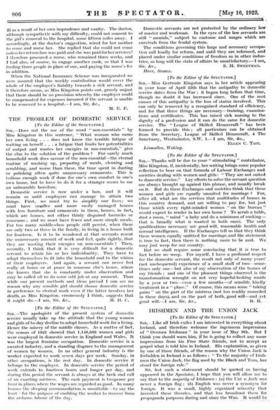THE PROBLEM OF DOMESTIC SERVICE [To the Editor of the
SPECTATOR.] SIR,—Does not the use of the word " non-essentials " by Miss Kingston in this sentence, " What woman who earns her own living . . . does not know the terrible fatigue of waiting on herself . . . a fatigue that limits her potentialities of output and wastes her energies in non-essentials," give the clue to the solution of the problem ? For surely much household work does savour of the non-essential—the eternal routine of washing up, preparing of meals, cleaning and scrubbing, and worse than these, the time spent in dusting or polishing often quite unnecessary ornaments. This is tedious enough work if done for one's own comfort in one's own home, but to have to do it for a stranger seems to me an unbearable boredom.
Domestic service is now under a ban, and it will remain so until employers. can manage to attain two things. First, we must try to simplify our lives ; we must have smaller and more easily managed houses with less furniture and ornaments in them, houses, in fact, which are homes, not either thinly disguised barracks or museums ; and we must have fewer and more simple meals. Far too many middle-class people still persist, when there are only two or three in the family, in living in a house built for fourteen. Is it to be wondered at that servants resent the unnecessary amount of work and feel, quite rightly, that they are wasting their energies on non-essentials ? Then, secondly, I think that it is very difficult for a domestic servant to retain his or her individuality. They have to adapt themselves to fit into the household and to the whims of their employers. And again, a servant can never feel really at home or at peace in someone else's house, where she knows that she is constantly under observation and may be called off to do some odd job at any moment. Thus while our present methods and ideas prevail I can see no reason why any sensible girl should choose domestic service in preference to elerical work even if the latter involves her death, as Miss Kingston, erroneously I think, suggests that
it might do.—I am, Sir, &c., M. H. C.










































 Previous page
Previous page